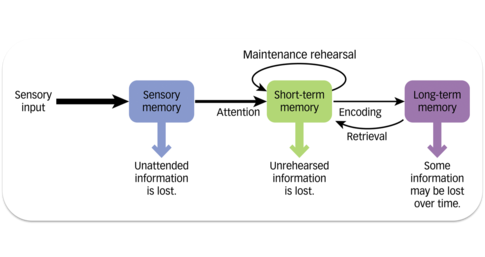Memory
Memory is a single term that reflects a number of different abilities: holding information briefly while working with it (working memory), remembering episodes of one’s life and our general knowledge of facts of the world among other types. Memory involves three processes:
- Encoding information – attending to information and relating it to past learning
- Storing – maintaining information over time
- Retrieving – accessing the information when you need it
The information processing model of memory is a useful way to represent how information from the world is integrated with the knowledge networks of information that already exist in our minds.
Sensory Memory is the part of the memory system in which information is translated from physical energy into neural signals. This is part of the encoding process. We receive information from our environment and we must perceive it and attend to it before it can move to our working memory.
Short-Term Memory (working memory) is the part of the memory system in which information can be temporarily stored in the present state of awareness. This type of memory is limited to 7 items of capacity and 7 to 30 seconds of duration on average.
Long-Term Memory is the part of the memory system in which information can be permanently stored for an extended period of time. It has a large to unlimited capacity and a duration that may last from minutes to a lifetime.
Semantic Memory is the type of long-term memory about general facts, ideas, or concepts that are not associated with emotions and personal experience.
Episodic Memory is a type of long-term memory about events taking place at a specific time and place in a person’s life. This memory is contextualized (i.e., where, who, when, why) in relation to events and what they mean emotionally to an individual.

Memory failures can occur at any stage, leading to forgetting or to having false memories. The key to improving one’s memory is to improve processes of encoding and to use techniques that guarantee effective retrieval. Good encoding techniques include relating new information to what one already knows, forming mental images, and creating associations among information that needs to be remembered. The key to good retrieval is developing effective cues that will lead the person back to the encoded information. Classic mnemonic systems can greatly improve one’s memory abilities.
Memory and Culture
It should be obvious, after learning about episodic memory that many of our memories are personal and unique to us but cultural psychologists and researchers have found that the average age of first memories varies up to two years between different cultures. Researchers believe that enculturation and cultural values influence childhood memories. For example, the way parents and other adults discuss, or don’t discuss, the events in children’s lives influences the way the children will later remember those events.
Mullen (1994) found that Asian and Asian-American undergraduates’ memories, on average, happened six months later than the Caucasian students’ memories. These results were repeated in a sample of native Korean participants, only this time the differences were even larger. The difference between Caucasian participants and native Korean participants was almost 16 months. Hayne (2000) also found that Asian adults’ first memories were later than Caucasians’ but Maori adults’ (native population from New Zealand) memories reached even further back to around age three. These results do not mean that Caucasians or Maoris have better memories than Asians but rather people have the types of memories that they need to get along well in the world they inhabit – memories exist within cultural context. For example, Maori culture is focused on personal history and stories to a greater degree than American culture and Asian culture. Differences in memory could also be explained by the values of individualistic and collectivist cultures. Individualistic cultures tend to be independently oriented with an emphasis on standing out and being unique. Interpersonal harmony and making the group work is the emphasis of collectivist cultures and the way in which people connect to each other is less often through sharing memories of personal events. In some cultures, personal memory isn’t nearly as important as it is to people from individualistic cultures.

